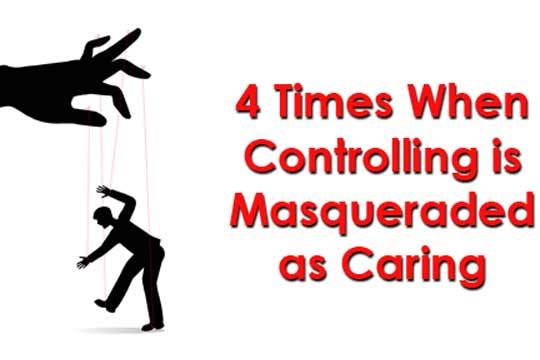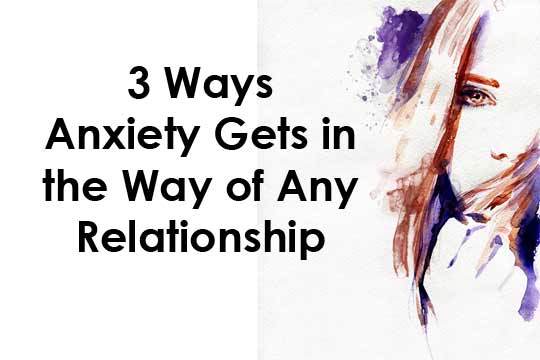Helene Lerner's Blog, page 23
June 1, 2016
4 Times When Controlling is Masqueraded as Caring

As women, we are the nurturers. We take care of our families, our homes, and responsibilities at the office. We give a lot and perhaps don't take in as much as we give out.
But giving can be tricky--and sometimes we may be guilty of controlling (and try to convince ourselves that it's really caring). But is it? See if you can identify with the situations below.
1. You try to convince a significant other to do it your way.
You feel that by showing them a better way you are expressing your care and concern. WRONG!
2. You want your children not to leave the house in such a mess.
You insist that they clean up now. After all, their friends are coming over and you want them to enjoy their time together. (Why should you care, if they don't?)
3. You like to pay it forward and people know to call you for advice.
When someone explains a situation and it goes against what you think is best, you insist that they are setting themselves up for failure. But is that really true, or do you think "I could never do it that way, how could they?" Why does your way have to be the best way?
4. You think the best way to take care of yourself is to show up for a friend in need--that would help her and be an act of self-care for you.
But is it really? By doing for her when you are "running on empty" is absolutely not a caring thing to do for yourself. She will survive, but will you. You can say "no" for now, but be there for her in the future, when you can really be available.
3 Ways To Get A Grip When Stress Is Pulling You Down

If you’re reading this, it’s likely you’re under the kind of stress you’d just love to get rid of. If what you’re dealing with is overloading your skills and resources, it can feel like a weight pulling you down and draining your strength. Here are three things to you need to know and do to get a grip on your stress instead of it having its grip on you:
Acknowledge it
The only thing worse than carrying a heavy load of stress is failing to realize the weight of the load you’re carrying. A client of mine has an abusive boss—but until recently he didn’t think it was a big deal. The problem is, when you say, “It’s not a big deal” you’re less likely to make the changes you need to stop the ongoing stress. Tell yourself, “I’m dealing with a really tough situation and it’s been affecting me.”
Give yourself credit for what you’re dealing with and you’ll gain a new level of respect for yourself. If you watched a friend or family member going through what you’ve been going through, would you tell them, “It’s not really a big deal.”? No, you’d say, “You should be proud of yourself, because this is hard.”
Identify solutions to stop the stress
We shouldn’t minimize our stressful situations, but we also have to avoid the other extreme—“catastrophizing” or “awfulizing” them. Instead, operate from the belief that there are always solutions.
Admittedly, that can be hard to do that when you’re overwhelmed—but you can do it. Resist the temptation of believing, “I’ve tried everything and nothing works.” If your relationship with your life partner is wearing you down, start with admitting that and then take action to make it better.
Just because the last two therapists or coaches didn’t help you, doesn’t mean the third one won’t—or that something else might not work. When stress is pulling you down, it’s your job to find the solutions that will stop the gravitational pull of that stress. One of my clients had the habit of letting her stressors pull her down until she adopted this motto for herself: “I’ll figure it out.” Believing more in herself was one of the solutions she identified and tapped into.
Own your power
“Stress” is subjective and we know that because what overwhelms one person motivates someone else. I have a client going through a divorce who has grown from it despite her husband doing all he can to make her miserable. She learned that the stories we tell ourselves about a problem or even huge challenges determine whether or not it overpowers us or if we discover how powerful we are.
Yes, she’s cried and there have been times she felt like giving up. Owning your power isn’t easy or we’d see everyone doing it. Learn to manage your self-talk, discover what your needs and true desires are and learn how to take care of yourself during times of stress. You have the power to do all three. If you’re going through a stressful time, use it. Learn about yourself, grow and find out how powerful you really are.

- Alan Allard, Creator of Enlightened Happiness
May 31, 2016
The Fastest Way to Build Confidence

It doesn’t take 10 years of stretch assignments or even 10 years of therapy to become rock solid confident.
In fact, most of the time the very approaches we take to build confidence are the ones that keep you at your current level of confidence. When it comes to confidence, shortcuts are the way to go!
In 10 years of research at Harvard Medical School, I learned that many of us involve other people in an effort to create a desired experience of confidence inside ourselves. You act toward other people, in order to get other people to act toward you, so that you can feel confident in yourself. Your time, energy and attention will go toward managing other people’s perceptions.
There are 3 common patterns you might do at work (or with people at home)
1. Seeking Approval:
When you don’t feel fully confident within yourself, you aim to get other people to think well of you so you can see yourself through their eyes. You put your time, energy, and attention into getting other people to think well of you - in the hope that others will approve, validate, reassure, or compliment you. In this way, you borrow their confidence. You might find yourself saying yes when it would be better to say no, saying what others want to hear, over preparing, micro-managing, asking other people for reassurance, fishing for compliments, talking a lot to show how smart you are, etc.
2. Preventing Disapproval:
To the extent you have doubt or self-criticism, it’s important to you that no one know about your perceived weakness. So you act to prevent others from disapproving or criticizing you
You might hold back, not speak up, not ask, avoid conflict, etc.
3. Judging Yourself (and others):
You might criticize yourself to monitor how you think others will see you. So you might focus on your flaws, only see ‘the gap’, re-do things over again. You’ll get stuck in beating yourself up and think you are ‘never enough’ (and neither are others). If things aren’t perfect, you think you have failed. Though your criticism of what ‘did wrong’ is intended to help you do it better next time, your self-criticism is not constructive - it keeps you feeling defeated.
In the moments when you have self-criticism or doubt, you do one of these behaviors to try to feel more confident. You try to boost your confidence with approval, prevent others’ criticisms, or judge yourself with the hope of improvement. These behaviors attempt to monitor how other people will see you and control how they will act toward you.
Growing up, we are taught to come to know ourselves through the eyes of others, so these are normal behaviors. If these behaviors help you get a compliment and prevent disapproval, what’s the problem? They have worked to get you here but won’t be the confidence you need to get you the life you want.
These behaviors give you a ‘quick fix’ – you get a momentary compliment, you avoid self-criticism, etc. but the effect is fleeting. It’s like a sugar high, you’ll come ‘down’ again soon and need to re-earn others approval, or prevent criticism in the next meeting as well. These behaviors are the long, slow way to confidence because you have to keep doing them over and over.
These behaviors are mental and exhausting. You are always second-guessing what others will think of you and you don’t build your own opinions. You compare yourself. You loop of self-criticism. That’s why your head can feel so noisy.
You can control your own behavior but you can’t control how others behave back toward you… so these behaviors are meant to control others but leave you feeling out of control of getting that confident feeling inside.
All that effort to be perfect…to not get criticized…but have these behaviors helped you to build that rock solid feeling of confidence from within? Have these approaches helped you to have confidence in the heat of the moment with difficult people?
No.
The solution? Here are 7 ways to have instant confidence.
Get your confidence from within. Get it from the rewards of helping people.Get it from the satisfaction of doing your job well and achieving a meaningful result.Get it from the enjoyment of learning and growing your skills.Get it from feeling calm and alive in your body. Get it from feeling love for and from other people. Get it from rising above your daily frustrations and making a difference in your life.
- Sharon Melnick, PhD
You can download your copy of my free report Sleep Under Stress: 19 ways to Get to Sleep and Wake up Rested at http://www.sharonmelnick.com/sleep
3 Ways Anxiety Gets in the Way of Any Relationship

Our anxiety, if left unchecked, can push people away. Here are some things to watch out for in a work relationship, friendship, and a romantic relationship.
Work Relationship: When we feel that we are not getting recognition, a promotion, or more money, our anxiety can prod us to behave in a way we will later regret. We may blurt out an inappropriate comment because we are trying to cover how we really feel. Helpful: When you are feeling anxious, take a moment to look at what's really going on. For example, are you angry? Knowing the whole story will give us some distance to act strategically.
Friendship: When a friend hurts you, intentionally or unintentionally, it can be particularly painful. Of course, anxiety can arise--one of our important relationships feels unsafe. Helpful: Deal with it, talk to your friend. Speak in "I" sentences, i.e., When I learned about _____, I felt __________. Don't let your hurt build up without dealing with the issue.
Romantic Relationship: You found out that your significant other has not been truthful with you. The result? Anger and anxiety. When this happens, you begin to doubt everything that he said, and things begin to snowball. How can you trust him again? That's a good question. Helpful: When you approach him, make sure it's well thought out. After all, what transpires can mean the end of the relationship. Try not to go on and on about how you feel. Say what you need to say, then listen.
4 Ways to Trust Your Intuition More

We get into trouble when we see signs about people, places and things, and we don't act on what we are feeling. How many times have you said to yourself, "I knew it, but I just didn't listen to my intuition?"
Here are some ways to deepen your connection with your "gut instinct", "inner sense," "intuition"--call it what you want.
1. Pen It Out.
When you get that "inner guidance," don't get busy doing something else. Give it the time it deserves, and one way of doing this is to write down what you feel. Don't censor what you are writing, just let go and let the pen touch the paper, and see what is written. It's almost like you are an observer and your "gut" is telling you what's really going on through written words.
2. Wrap Yourself in Nature.
Yes, go to a park or hike a trail (if you have time to do that), being around a tall oak, for example. A natural setting can be very spiritual and conducive to reflect on what your gut is telling you.
3. Connect with a Kindred Soul.
Spend time with a friend or an acquaintance who you feel is in touch with her intuition. Share thoughts about what's going on and ask for her feedback. It may be quite interesting to hear her reaction.
4. Mirror Talk.
Look at yourself in the mirror. They say the eyes are the window to the soul. If you’re challenged by a problem, ask inwardly for a solution. Keep focusing on your eyes, which connect to a deeper part of you, allow the answer to surface.
5 Comebacks for Verbally Abusive People

We all have experienced those people who spew venom and we wish that they weren't on the planet, or at least not our side of the planet.
But sometimes we have no choice in the matter and we have to deal with them. How do we keep them at bay, here are a few things we can do and say in response to their toxic behavior.
1. “Are you talking to me?” Confront them and put them on the spot.
2. Ignore them. Their "ego" will not know what is going on, and they will likely feel disturbed.
3. "I'm sorry you feel that way." No you aren't, but say you are. Let them see that they can't get to you.
4. "You must be having a bad day." Here you are being gracious to them, putting yourself in their position. They won't know what to make of it.
5. "I will not stoop to your level." Let them know you are annoyed, but don't lose your cool. If you do, they will only try harder to unearth you because they see they are getting to you.
How to Learn to Trust People You Don't Know Well
 Despite the fact that many people still believe people don’t have to get along at work; they just have to do their jobs, it’s almost impossible to work well with people you don’t trust.
Despite the fact that many people still believe people don’t have to get along at work; they just have to do their jobs, it’s almost impossible to work well with people you don’t trust.
Lack of trust contributes to a dysfunctional workplace – people not getting their work done and making mistakes.
While you can’t control other people’s behaviors, you can control yours. There are actions you can take to build trust so that you can flourish. It’s hard to trust people you don’t know, and when you need help, you are unlikely to ask someone you don’t trust.
Here are five ways to build trust at work:
1. Take time to get to know at least one co-worker.
Find out what they like about working at your company, what they love doing outside of work, and any hidden talent or skill they may have. Connect where you have common interests and express interest in what you don’t know. Perhaps you both like to cook or your co-worker is working on a new app. You can share recipes or ask questions about the app. You’re establishing a new way of seeing each other which can start to build trust.
2. Refuse to take part in gossip, listening to rumors, or labeling someone based on another person’s judgment.
Quash the conversation any time it starts. After a while, people will trust and respect you as someone who is honest and that they can talk to and ask for help.
3. Everyone is busy doing their work, trying to meet deadlines, and stressed for time. Don’t be one of those people.
Take time to answer questions, give positive feedback to others, and offer help. This will ultimately save you time and energy because others will support you back, and share best practices
4. Be empathetic.
If you know your colleague is feeling overwhelmed or stressed, talk to them. Acknowledge their situation. Often a simple acknowledgment can reduce stress, make the other person stop for a minute, and engage with you. You don’t need to rescue anyone else; you just need to be a supportive peer.
5. Keep your word and honor your commitments.
Only say yes to a project or task you can finish, and don’t set unrealistic deadlines. Not keeping your word and not coming through is the best way to get a reputation for not being trustworthy. Be known as the person who can be trusted to do what you promise.
And finally, overall, greet everyone with a smile and say hello. Make a connection and make a work friend.

Simma Lieberman helps create inclusive work cultures where people love to do their best work. She is a consultant, speaker and executive coach. For more information visit www.simmalieberman.com
May 28, 2016
5 reasons you need to make time for good sex with your partner
 When we talk about sex, there's usually controversy involved. (And everyone has an opinion). But the fact of the matter is, if you are in a romantic relationship and sex is not good, your relationship may go through some tough times.
When we talk about sex, there's usually controversy involved. (And everyone has an opinion). But the fact of the matter is, if you are in a romantic relationship and sex is not good, your relationship may go through some tough times.
Why is good sex so important, take a look.
1. It helps sustain intimacy. Most of us realize that the ability to be intimate with a partner is not just what goes on between the sheets, but involves communicating and listening to each other, among other things.But if sex is not happening enough, or non-existent, something is wrong in the relationship that needs to be addressed.
2. It's a stress reducer. The stress of everyday life brings with it many difficulties, good sex is a great way of releasing tensions that have been building up.
3. It fosters honesty. When your body releases pent up tensions through sex, and sex has been satisfying for both partners, there is an opportunity for more open communication.
4. It creates deeper ties. When you know someone on different levels, sex can be a culmination of how much you really care for your partner.
5. Life gets very busy, you have to make the time. It's essential to put the effort into creating "dates" with each other to rekindle the passion between you. If there has been a lull, here are some things to keep in mind.
. Don't deny it. You are feeling some tension between the two of you, address it.
. Be seductive, you initiate. Set the stage for some enjoyable sex.
. Notice when your partner is being seductive, observe if you are putting him off, too many times. What's really behind you're being too busy?
May 27, 2016
5 Ways Couples Keep Their Love Burning Strong

Turning our mate into our soulmate is a process that requires daily attention, if not the occasional minute-by-minute effort when we must remember to choose love. Choosing love is when we realize that our partner's happiness is as important to us as our own happiness and that we are committed to sharing with that person our appreciation, affection and attention....When we find ourselves noticing or even obsessing about our partner's imperfections, we remember to stop and manage our thoughts and reframe them in a positive manner....
The lessons learned from happy couples are simple, yet the results can be life-changing.
1. Express your love and affection--often.
2. Show care. It's the little gestures that mean everything.
3. Learn to love what your partner loves, so you can participate in some of his or her passions.
4. Practice vulnerability and share yourself with authenticity and honesty, always with tremendous love, kindness and generosity.
5. Remember to find the beauty and perfection in the imperfection.
Adapted from Turn Your Mate Into Your Soulmate by Arielle Ford.
3 Things To Remember When You Feel Defeated
 No one likes to feel defeated. No one likes to feel uncomfortable. No one likes to feel that they can’t see the light at the end of the tunnel. But we all go through these tough times. Here are some ways to pull through when things are getting you down.
No one likes to feel defeated. No one likes to feel uncomfortable. No one likes to feel that they can’t see the light at the end of the tunnel. But we all go through these tough times. Here are some ways to pull through when things are getting you down.
It’s okay to feel bad.
Even the people you admire the most have gone through tough times. Allow yourself to feel the feelings and don’t put yourself down. When we are not in touch with our emotions and sensations, we’re listening to negative mind-talk. Mad mind-chatter gets you nowhere.
You’ve been here before.
Look at your track record. You’ve felt these feelings, you weren’t sure how you would get back up again, but you did. Even if you don’t feel this way, have faith that your desire to push through is greater than your feelings of defeat.
There’s good in the bad.
Everything that happens to us is for our growth. When we see things with that perspective, we can connect with what we’ve learned from even the most painful experience. It’s often in times of stress that the greatest learnings happen.
Helene Lerner's Blog
- Helene Lerner's profile
- 9 followers



